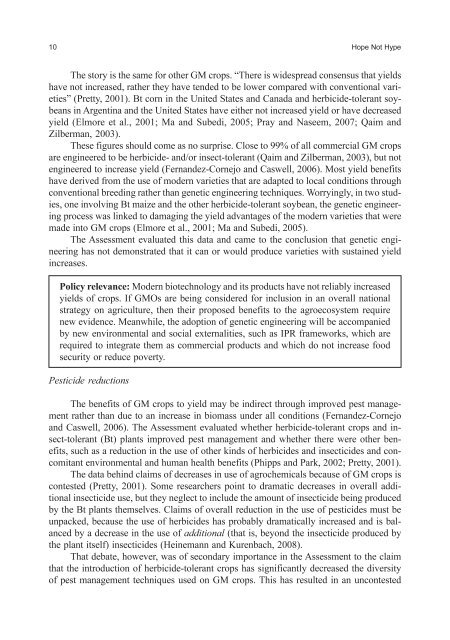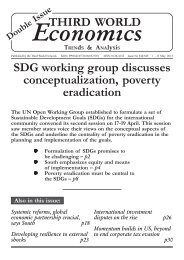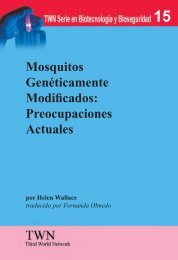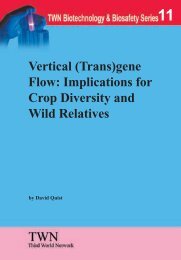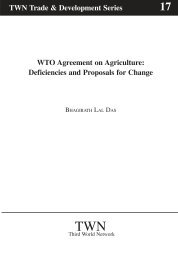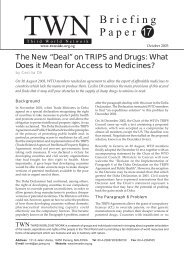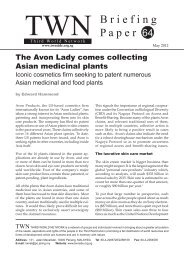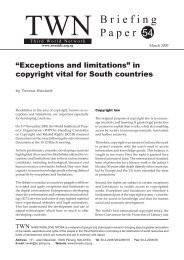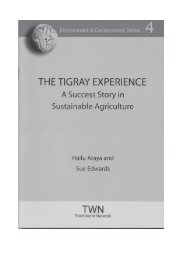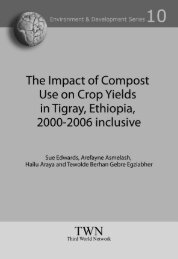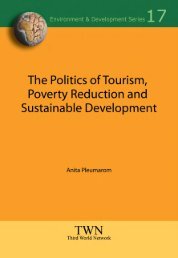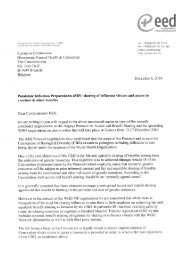Hope Not Hype - Third World Network
Hope Not Hype - Third World Network
Hope Not Hype - Third World Network
- No tags were found...
You also want an ePaper? Increase the reach of your titles
YUMPU automatically turns print PDFs into web optimized ePapers that Google loves.
10 <strong>Hope</strong> <strong>Not</strong> <strong>Hype</strong><br />
The story is the same for other GM crops. “There is widespread consensus that yields<br />
have not increased, rather they have tended to be lower compared with conventional varieties”<br />
(Pretty, 2001). Bt corn in the United States and Canada and herbicide-tolerant soybeans<br />
in Argentina and the United States have either not increased yield or have decreased<br />
yield (Elmore et al., 2001; Ma and Subedi, 2005; Pray and Naseem, 2007; Qaim and<br />
Zilberman, 2003).<br />
These figures should come as no surprise. Close to 99% of all commercial GM crops<br />
are engineered to be herbicide- and/or insect-tolerant (Qaim and Zilberman, 2003), but not<br />
engineered to increase yield (Fernandez-Cornejo and Caswell, 2006). Most yield benefits<br />
have derived from the use of modern varieties that are adapted to local conditions through<br />
conventional breeding rather than genetic engineering techniques. Worryingly, in two studies,<br />
one involving Bt maize and the other herbicide-tolerant soybean, the genetic engineering<br />
process was linked to damaging the yield advantages of the modern varieties that were<br />
made into GM crops (Elmore et al., 2001; Ma and Subedi, 2005).<br />
The Assessment evaluated this data and came to the conclusion that genetic engineering<br />
has not demonstrated that it can or would produce varieties with sustained yield<br />
increases.<br />
Policy relevance: Modern biotechnology and its products have not reliably increased<br />
yields of crops. If GMOs are being considered for inclusion in an overall national<br />
strategy on agriculture, then their proposed benefits to the agroecosystem require<br />
new evidence. Meanwhile, the adoption of genetic engineering will be accompanied<br />
by new environmental and social externalities, such as IPR frameworks, which are<br />
required to integrate them as commercial products and which do not increase food<br />
security or reduce poverty.<br />
Pesticide reductions<br />
The benefits of GM crops to yield may be indirect through improved pest management<br />
rather than due to an increase in biomass under all conditions (Fernandez-Cornejo<br />
and Caswell, 2006). The Assessment evaluated whether herbicide-tolerant crops and insect-tolerant<br />
(Bt) plants improved pest management and whether there were other benefits,<br />
such as a reduction in the use of other kinds of herbicides and insecticides and concomitant<br />
environmental and human health benefits (Phipps and Park, 2002; Pretty, 2001).<br />
The data behind claims of decreases in use of agrochemicals because of GM crops is<br />
contested (Pretty, 2001). Some researchers point to dramatic decreases in overall additional<br />
insecticide use, but they neglect to include the amount of insecticide being produced<br />
by the Bt plants themselves. Claims of overall reduction in the use of pesticides must be<br />
unpacked, because the use of herbicides has probably dramatically increased and is balanced<br />
by a decrease in the use of additional (that is, beyond the insecticide produced by<br />
the plant itself) insecticides (Heinemann and Kurenbach, 2008).<br />
That debate, however, was of secondary importance in the Assessment to the claim<br />
that the introduction of herbicide-tolerant crops has significantly decreased the diversity<br />
of pest management techniques used on GM crops. This has resulted in an uncontested


